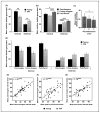Episodic simulation of past and future events in older adults: Evidence from an experimental recombination task
- PMID: 20545421
- PMCID: PMC2896213
- DOI: 10.1037/a0017280
Episodic simulation of past and future events in older adults: Evidence from an experimental recombination task
Abstract
We recently reported that older adults generate fewer episodic details than younger adults when remembering past events and when simulating future events. We suggested that the simulation findings reveal an age deficit in recombining episodic details into novel events, but they could also result from older adults "recasting" entire past events as future events. In this study, we used an experimental recombination paradigm to prevent recasting while imagining and to compare imagining the future with imagining the past. Older adults generated fewer episodic details for imagined and recalled events than younger adults, thereby extending the age-related simulation deficit to conditions of recombination.
(c) 2010 APA, all rights reserved
Figures

References
-
- Addis DR, Pan L, Vu M-A, Laiser N, Schacter DL. Constructive episodic simulation of the future and the past: Distinct subsystems of a core brain network mediate imagining and remembering. Neuropsychologia. 2009;47:2222–2238. - PubMed
-
- Addis DR, Wong AT, Schacter DL. Age-related changes in the episodic simulation of future events. Psychological Science. 2008;19:33–41. - PubMed
-
- Arbuckle TY, Gold DP. Aging, inhibition, and verbosity. Journal of Gerontology: Psychological Sciences. 1993;48:P225–P232. - PubMed
Publication types
MeSH terms
Grants and funding
LinkOut - more resources
Full Text Sources
Medical
Miscellaneous

